|
Space: The UK's Unventured Final Frontier
The United Kingdom is one of the richest nations on
the planet, yet when it comes to Investment in Space, the UK is lagging well
behind.
Presently, total UK government expenditure on space totals just £181
million in fiscal yr 2000-01. This represents just 0.05% of total
spending. For 2002-03 and all projected future years, there is no expected
change in such funding levels.
The question is this, does the exploration and utilisation of Space
merit a bigger investment that £181 million per year ?
It could be justifiably argued that the general population see no
purpose in further, or indeed any level of investment in space. However
despite such a problematic attitude, the UK should I believe be more
actively involved in matters which are beyond the Earth's atmosphere.
What I shall propose in this summary report is not a minor slight change
of government policy. It is instead a radical and dynamic shift in
attitude. Yet I do
believe such a new initiative is justified not only on the basis of protecting the UK's long
term security, but also justifiable on economic grounds.
First, it is useful to
consider the state of the American space programme: NASA - National
Aeronautic Space Administration. America's rapidly developing space programme reached a
climax in 1969 with Neil Armstrong first setting foot upon the moon. Since that time, America
has maintained a steady investment in space activities. Although NASA's
work is no longer as prominent in the public eye as it was during the 'Apollo
era', NASA continues to do a great deal of work. Despite
chronic accounting difficulties that NASA has suffered from
over the last decade, America's space agency continues to strive forward
and maintains a dominating presence in Space.
Most people even in the
developed media-saturated western world are very much unaware of what is
currently going on above their heads. Currently, the International Space
Station (ISS) is in a stable low earth orbit- around 225 miles high,
travelling at 20,000mph. The ISS continues to expand every few months, as
both America and the Russian space agencies contribute new sections to
this grand design. The ISS maintains a constant crew of 3, and each
'expedition' last around 4-6 months. Even though the station is far from
finished (due for core-complete 2004), the ISS does have one science
laboratory already attached -Destiny. This lab is already being used for
some scientific research, although is not at full capacity due to the
current crew limit of 3 ( they are aiming for a permanent crew of 6-7 ).
The fact that most people are completely unaware of the ISS is one
of the greatest problems facing new investment in a UK Space program. Ask
most people whether government should spend tax money on space and I think
we can safely assume most would say 'why, what do we get out of it ?'.
The ignorant ones - as I heard one such person on a radio talk show
recently, tend to always bring up the 'teflon' issue. For some bizarre
reason, the anti-space people argue that all humanity ever got out of the
space programme was a non-stick set of kitchen pots and pans.
I will not run off a long list of technological marvels that have
directly and indirectly come about because of the space programme. NASA
I'm sure would be more than happy to provide such a list. I do however
have to argue that modern desktop computing is primarily a result of the
early space investment that occurred from 1940 to the early 1970's. The
development of modern computing alone could easily be said to justify the
entire space programme.
For the record, I have always found that the people most against
investment in the space programme are those of a strongly religious
persuasion. Such people have always had a great resistance to science in
general, and we should simply ignore them when it comes to any serious
debate about the costs/benefits of any new space investment.
For the UK to become a significant part of the international space
fairing community, I suggest the following basic proposals be implemented
over the course of 5-8yrs.
Proposals
-A dedicated UK Astronaut
presence aboard ISS.
-A UK science lab attached to the ISS, specifically for the UK research
establishment, with any spare facilities loaned to other countries. There
is a demand for space research from world multi-nationals, the problem has
always been that the initial investment is a hindrance to private
companies getting involved.
-Specific UK Universities to be funded and to specialise in Space related
Engineering.
The UK must have the NASA equivalent of the US Jet Propulsion Laboratory
(JPL).
-Media/Public Education
Schools : awareness of the importance of Space, the ISS, as part of
the national science curriculum.
TV: A dedicated channel for UK live space activities, comparative
to NASA TV.
National Centre for Space, to be expanded, and to link in with the
new space initiative, Universities, and UK related research companies.
The costs of investment
Well, the cost factor is of course something that must not be
avoided in any discussion.
As noted earlier, currently the UK invest around £180 million a year -
which is essentially irrelevant in budgetary terms. For any space
initiative to have real success, significant and consistent funding is
required.
Note again that NASA spends an annual $15billion on space
activities, which equates to around £10 billion. Of NASA's budget, around
$5billion is spent annually on the ISS, the rest of the NASA budget is
spent on many other things, such as earth research and communication.
In my space initiative proposal we would see the UK with the following
yearly expenditure...
Yr 1: £750 million in basic
infrastructure, to fund new research/engineering schools.
Yr 2-3 : 1.25 billion per year in continued growth and recruitment of
necessary people as part of the University research plan.
Yr 4-6 : Standard 1billion per yr in Research.
+ UK science lab investment : 1.5billion over 3yrs
Cost as a full member of ISS, 250million per year.
Yr's 7-10 and beyond. An annual investment in the range of £2 billion
annually, which would cover the costs of all the aforementioned
activities.
---
Overall, the annual investment in Science Research and ISS cost would
total £1.25-1.75 billion per year. This figure would cover the dedicated
University research in Aerospace, and all cost associated with being
having a permanent member of the ISS consortium. So, once we round up a
little for inflation and a few extras, we are looking at a figure of
around £2billion a year for a UK space programme.
Is £2 billion
justifiable ? The UK government currently spend around £375 billion
(2002-03). The proposal I outline would therefore constitute just 0.53 of
1 percent of current government expenditure. Is this really too brave a
new vision for the UK to adopt and follow over the longer term?
A few points of note. Currently it would make no sense at all for
the UK to build its own launch facilities. NASA has an immense capacity
for launches, and taking advantage of NASA's launch facilities in Florida
for instance would be most cost effective. Further, space launches in
England would be suffer from climate issues, and the fact that even
Southern England is too far north for the most cost effective launch site.
What I am proposing is that the UK takes the lead within Europe,
and begins its own self-funding space programme, that will in time become
the centre-piece for UK science research in the first haft of this
century. Funding would not exclusively from the public sector. There are
many private corporations worldwide who are looking for a government that
is seriously interesting in commercialising space. In particular, Space
lab research would be funded partly by UK/global companies renting
research space from the UK space lab. I am suggesting a programme that is
closely linked primarily with NASA, but also involves the European Space
Agency, and potentially one of the upcoming space fairing countries -
China and India.
Benefits for the UK people
The benefits to the UK of a new space initiative would be far
reaching across many sectors of the UK economy.
Firstly, it is a sad fact that the UK University scientific
research community is chronically under funded. The infrastructure of many
universities is hopelessly outdated and literally falling apart. Many
colleges lack adequate resources to carry out even standard research,
never mind research for a laboratory in the 21'st century. A billion
pounds per year devoted to the space-science research sector would be a
major boost to the UK research community.
UK national security is of course a paramount issue, the issue of
Near-earth-objects is increasingly now being taken seriously. The fact is
sooner or later a great chunk of rock is going to hit our planet, and
could well cause millions of lives to be lost. Currently there is no
properly funded community that even monitors such space rocks. This
situation must be addressed before it is too late.
Finally, I would like to believe that Space exploration itself can
be a visionary motivator to all UK people, inspiring people to believe in
something very different than what they are accustomed to. Currently there are
no major 'visionary' projects in the UK, not one. A permanent UK presence
in Space would be a fine start to focusing the nation on the important issues that
need to be tackled this century.
A new Space Race ?
As I write this summary proposal, 2003 is going to be a truly
remarkable year for the world space programme. Sometime later this summer,
China will launch their first 'taikonaut' into space aboard the Shenzhou
5. China has a massive drive for a manned space programme, and has
outlined plans for a moon landing by 2010, maybe as early as 2007. The
interesting thing about China is that it has full government support. The
government are also driving the message home to the Chinese people that
space explorations one of the most prestigious and important endeavours of
any nation. Clearly, China is going to be dominating the space news
headlines later this year when they have their first taikonaut in orbit.
As well as China's progress, the ISS will see a massive new year of
construction, with new 'towers of power'- giant solar panels arrays being
added. Further other additions to the overall structure are also lined up
for 2003.
India is also planning to enter the space race this year, with new
developments in its orbital rocket technology - although, much of that is
a result from it's nuclear programme. Admittedly, much space investment is
heavily linked with military concerns.
Lastly, the ESA in 2003 will continue to work on many projects,
including their own space lab, which is due to be added to the ISS in
2004.
As 2003 proceeds I would like to have thought that the UK would be
part of this new wave of space exploration, but sadly this is not the
case. Prime Minister Blair has never shown any vision on the 'greater'
projects, such as renewable energy, an advanced human transportation
network, or indeed a UK space
programme. The UK is one of the leading economic nations, yet not one
political leader has ever shown any vision for space investment.
America, China, India, Russia and France have all recognised the
importance of space as being a key element towards a successful 21'st
century, will the UK ever join this grand vision ?
Contact Calrissian
Last updated :
08/10/04 |
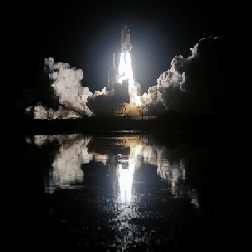
STS-113, launches in late 2002:
Photo: NASA
UK Govt Space investment
Raw Figure : £181 million (2000-01)
As % of Total Govt Expenditure: 0.05%
Note...
2000-01 UK Govt expenditure : £366.8 billion
*Total managed expenditure.
see : HM Treasury
-----
USA Govt Space investment
Raw Figure : $15 Billion fiscal yr, 2002-03
As % of Total Govt Expenditure : 0.70 %
Note
2002-03 US Govt expenditure : $2.128 Trillion.
see : Office of Management
and Budget
GDP per capita (2001)
UK : $ 22800
USA: $ 36200
see :
World Economic Data
General links
European Space Agency
(ESA)
NASA Human Spaceflight
British Centre for Space
---
Articles...
Spaceflight now
: UK lacking space ambition
UK Parliament :report on Space Investment
Also see Space links
section
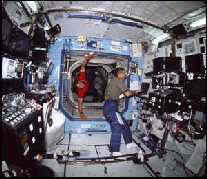
Inside the Destiny Laboratory
Picture Courtesy of
NASA

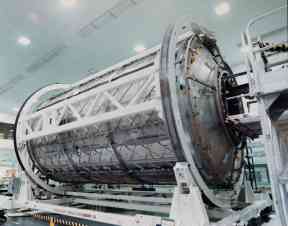
American Lab : Destiny. A UK Lab similar to this would be the centrepiece
to a UK Space initiative.
Photo : NASA
The following 2 schematics show the development of the ISS during 2003,
the most noticeable changes are the addition of new solar arrays.
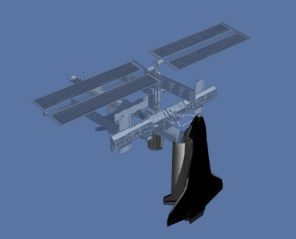
Schematic of ISS Jan 2003 with shuttle attached
NASA conceptual art.

Schematic of ISS Nov 2003 with new solar arrays.
NASA conceptual art. * For
complete details on how the ISS is being constructed over coming years:
ISS
Construction.
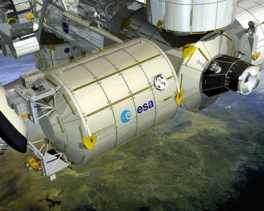
ESA's Columbus Lab attached to ISS '2004
Photo :ESA / D.Ducros
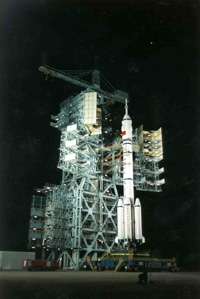
China's Shenzhou 4 on the Pad.

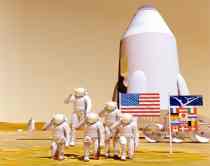
Life on Mars... 2020 ?
Artist conceptual art : NASA |










